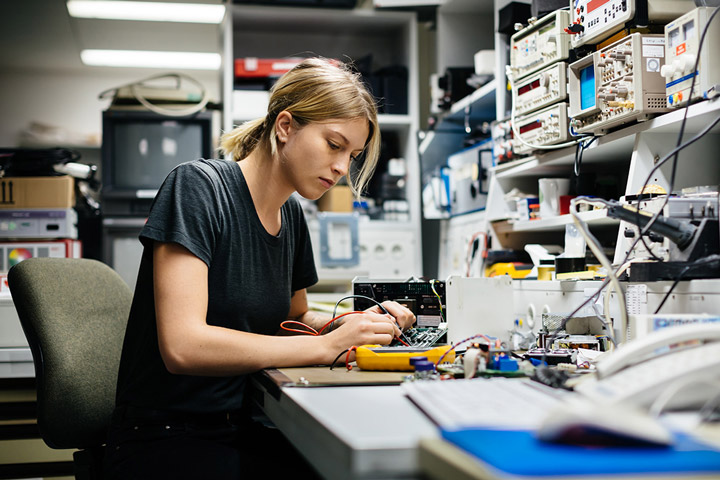
OverviewAbout this course
Turn the power up on your electrical career and gain transferrable skills in an exciting industry. You’ll learn to work safely and sustainably while developing the practical knowledge you need to work in the specialised instrumentation industry.
OutcomesWhat you'll gain
Learning outcomes
Through a mixture of theory and practical course work, learn to:
Work safely within industry guidelines
Solve problems in a variety of measurement components and systems
Install wiring and accessories
Fabricate and assemble industry components
Use instrumentation drawings, specifications, standards and equipment manuals
Course outcomes
Gain practical experience and develop specialist skills that give you an advantage in the job market.
Skills in implementing procedures for dealing with hazardous events
The ability to apply principles of process control embodied in drawings, industry standards, specifications and equipment manuals
A strong pathway to continue your study and enhance your career opportunities
SuitabilityIs this course right for you?
Entry requirements
This course requires evidence of previous experience or study before you can enrol
Successful completion of a Certificate III in Electrotechnology Electrician, as evidenced by a copy of your academic transcript or
A current Unrestricted Electricians License or its equivalent, as evidenced by a certified copy
Completion requirements
During your study you’ll need to provide your teacher with the following evidence:
Entry recommendations
To be prepared for this course, we recommend that you have:
An interest in industrial instruments
Strong attention to detail
An enjoyment of problem-solving and analysis of electrical issues
Experience with industrial computers and applications in an industrial environment
Confidence working in confined spaces and at heights
TAFE NSW is committed to meeting the learning needs of every community. Meeting these needs can mean there are additional entry requirements at different campus locations. Check your preferred location for further requirements. If you need help preparing for study, contact us to find out how we can support you.
PathwaysFuture career and study options
Career pathways
Our graduates go onto roles like:
Electrician (General)
Electricians (General) install, test, connect, commission, maintain and modify electrical equipment, wiring and control systems.
Full-time share Full-time workers usually work 35 hours or more a week (in all their jobs combined).
92%
Employment size Employment size is the number of workers who do this as their main job.
42,200 workers
Average age This is the average age of all workers in this job.
37 years
Weekly pay Median earnings are shown for full-time, non-managerial employees paid at the adult rate, before tax or any amounts that are salary sacrificed. These figures are a guide to earnings only and should not be used to determine a wage rate.
$1,420
Average full-time The average full-time hours that people in this role work each week.
44 hours
Skill level rating Skill level ratings are based on the range and complexity of job roles. In general, the higher the skill level, the more formal education and training, previous experience or on-the-job training needed to be good at the job.
Medium
Gender share
1% female
Future growth The Department of Employment, Skills, Small and Family Business estimates the likely change in number of workers in this role, or industry, over the next 5 years. Future growth is the likely percentage change compared to all other job roles.
Strong Growth
Other jobs include: Instrumentation technician, Industrial automation and control technician and Aerospace technician
Licensing
There are many career pathways and opportunities to choose from when you graduate from the Certificate IV in Electrical - Instrumentation. It’s important to check the licensing, legislative, regulatory and certification requirements relating to your future career by visiting NSW Fair Trading or your state licensing body.
Study pathways
Take your study further with other courses offered at TAFE NSW:
Previous study1 Course
Begin here to gain experience and confidence in this study area.
Further study1 Course
Advance your skills to take your career to the next level
Related study2 Courses
Strengthen your expertise and gain specialist skills to expand your employability.
Your experience counts
At TAFE NSW, we recognise your previous study and work experience. You can apply for recognition of prior learning or a credit transfer with any of our courses. If you're successful you'll get your qualification faster.
UnitsUnits taught in this course
Courses are made up of a combination of both core and specialty units. In the Certificate IV in Electrical - Instrumentation qualification, you’ll need to successfully complete 440 Weighting points, including 320 core and 120 speciality units.
Please note, not all specialty units are offered at every TAFE NSW location. It is highly recommended that you check with your preferred campus for information about the specialty units offered at that location.
Core units are central to the job outcomes of a particular industry or occupation. These are the units industry has agreed are essential to be capable and qualified at a particular study level.
Compile and produce an energy sector detailed reportUEECD0010
Implement and monitor energy sector WHS policies and proceduresUEECD0024
Participate in development and follow a personal competency development planUEECD0027
Solve problems in density/level measurement components and systemsUEEIC0038
TAFE NSW servicesFacilities and support
TAFE NSW provides support services across all campus locations and online. Whatever your needs or circumstances, we have the people, resources, counselling and facilities to support you in focusing on your studies.
TAFE NSW Disability Support Service
TAFE NSW Language, Literacy and Numeracy (LLN) support
TAFE NSW Aboriginal Support; Learner support (ABE)
TAFE NSW Careers, Counselling and Pathways Service
TAFE NSW Libraries
Scholarship programs – be supported as you explore your talents and fulfil your potential
Read&Write literacy and study support software is available free for all TAFE NSW students to use while studying on campus and at home
LinkedIn Learning – an online resource which offers innovative courses and tutorials to improve your personal and professional skills
Student associations – get social with our student community